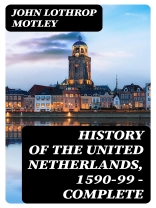John Lothrop Motley’s ‘History of the United Netherlands, 1590-99 — Complete’ is a comprehensive account of the events that took place in the United Netherlands during the late 16th century. Motley’s meticulous research and detailed narrative bring to life the political intrigue, military campaigns, and societal changes that shaped this tumultuous period in Dutch history. Written in a clear and engaging style, the book is considered a masterpiece of historical literature, offering valuable insights into the complexities of the time. Motley expertly weaves together primary sources and his own analysis to present a thorough and unbiased perspective on the events of the period. His attention to detail and vivid storytelling make this work a must-read for anyone interested in European history or the Dutch Golden Age. Motley’s background as a historian and diplomat uniquely qualifies him to write about this period of Dutch history, having served as U.S. Minister to Austria and Minister to Great Britain. His firsthand experience and intimate knowledge of diplomatic affairs lend credibility to his narrative, making it a trustworthy and authoritative account of the United Netherlands in the late 16th century.
Yazar hakkında
John Lothrop Motley (April 15, 1814 – May 29, 1877) was an eminent American historian and diplomat. Born in Dorchester, Massachusetts, Motley was educated at Harvard College and later at the universities of Berlin and Göttingen in Germany. His passion for history, particularly European history, was ignited during his studies in Germany. While he embarked on a brief legal career post-graduation, it was the literary and historical arenas where Motley truly excelled. His mastery of history is most apparent in his magnum opus, ‘The History of the United Netherlands from the Death of William the Silent to the Twelve Year’s Truce, 1609, ‘ published in four volumes between 1860 and 1867. This seminal work etches out the complex political, social, and religious canvas of 16th- and early 17th-century Netherlands, illuminating the rise of Dutch independence and Protestantism while underscored by profound narrative craft. Motley’s accounts are thorough, often dramatic, coupling scholarly rigor with storytelling prowess. Although his perspectives are sometimes critiqued for particular biases reflective of his own cultural and political milieu, his contributions to the understanding of Dutch history and, more broadly, the European Reformation and Renaissance, are invaluable. Unfortunately, his diplomatic tenure as United States Minister to the United Kingdom, for which he was appointed by President Grant, was marred by difficulties, leading to an early recall. Nevertheless, his literary legacy persists as a testament to his deep historiographical influence.












